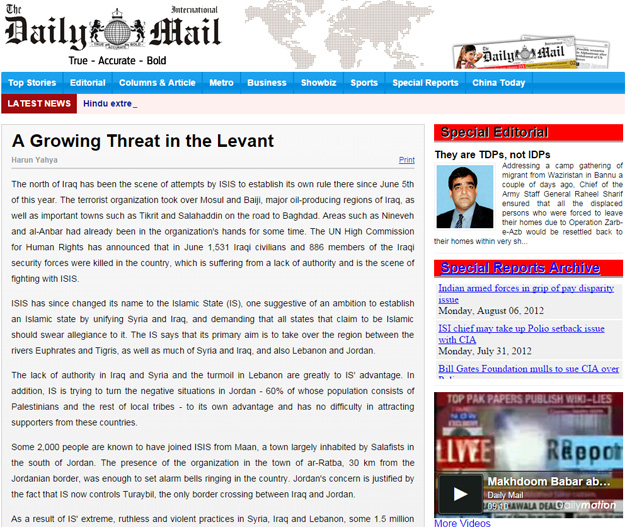MILLI GAZETTE
.png)


The north of Iraq has been the scene of attempts by ISIS to establish its own rule there since June 5th of this year. The terrorist organization took over Mosul and Baiji, major oil-producing regions of Iraq, as well as important towns such as Tikrit and Salahaddin on the road to Baghdad. Areas such as Nineveh and al-Anbar had already been in the organization’s hands for some time. The UN High Commission for Human Rights has announced that in June 1,531 Iraqi civilians and 886 members of the Iraqi security forces were killed in the country, which is suffering from a lack of authority and is the scene of fighting with ISIS.
ISIS has since changed its name to the Islamic State (IS), one suggestive of an ambition to establish an Islamic state by unifying Syria and Iraq, and demanding that all states that claim to be Islamic should swear allegiance to it. The IS says that its primary aim is to take over the region between the rivers Euphrates and Tigris, as well as much of Syria and Iraq, and also Lebanon and Jordan.
The lack of authority in Iraq and Syria and the turmoil in Lebanon are greatly to IS’ advantage. In addition, IS is trying to turn the negative situations in Jordan - 60% of whose population consists of Palestinians and the rest of local tribes - to its own advantage and has no difficulty in attracting supporters from these countries.
Some 2,000 people are known to have joined ISIS from Maan, a town largely inhabited by Salafists in the south of Jordan. The presence of the organization in the town of ar-Ratba, 30 km from the Jordanian border, was enough to set alarm bells ringing in the country. Jordan’s concern is justified by the fact that IS now controls Turaybil, the only border crossing between Iraq and Jordan.
As a result of IS’ extreme, ruthless and violent practices in Syria, Iraq and Lebanon, some 1.5 million have left their homes and fled elsewhere and that forced migration is growing by the day. As a result of its efforts to forcibly impose its own sectarian and highly dogmatic beliefs and lifestyles and its use of repression and violence, which are forbidden in Islam, millions more are in a state of panic. People of different faiths in newly conquered areas, who have lived there for hundreds of years, are told to “Become Muslims, or die.” Yet God’s command in the Qur’an is quite explicit – “There is no compulsion in religion.” Yet a bigoted and misinformed philosophy literally has created a hell on earth. As non-Muslims flee the persecution of IS, Muslims who do not sign up to the organization’s belief and lifestyle word for word are also exposed to the same violence.
The IS, which misinterprets the Qur’an and relies on non-Qur’anic sources filled with nonsense, employs policies of the severest repression based on this erroneous philosophy of life in the areas it takes over. However, by abandoning the essence of the faith for false information, they have adopted a style of politics totally divorced from human love, that is ignorant of compassion and affection and that cannot live by the peace, compromise, brotherhood and friendship inherent in Islam. The more they depart from the essence of Islam, the more an inhumane, repressive despotic and violent lifestyle emerges.
So how can such radical organizations that are trying to reshape Iraq, Syria and the entire Middle East and that resort to violence to that end, be stopped?
Muslims failing to unite around their commonalities, delays in forming an alliance of the good and people seeking teachers of violence, rather than of love, is inflicting only needless pain and suffering. Yet if these people who have been left ignorant and loveless in the region were educated individually, rather than everyone arming themselves, those people could be won over because fanaticism is a treatable illness.
Fanatical teachings based on tradition and nonsense lead to corruption everywhere. Violence cannot be the way to put an end to violence, because violence simply begets violence. And as violence begets violence, more people learn violence. Many Islamic countries, and especially Syria and Iraq, have become schools of violence in this way. The time has now come to build schools of love instead.


